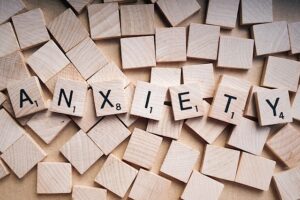Anxiety is a common mental health condition that affects millions of people worldwide. It is characterized by excessive worry, fear, and nervousness, which can be triggered by a range of factors. Identifying the triggers of anxiety is crucial in managing the condition and preventing it from becoming overwhelming.

There are several common triggers of anxiety, including stress, health issues, traumatic events, and certain medications. Stress is one of the most common triggers of anxiety, and it can be caused by a range of factors, including work, relationships, and financial problems. Health issues, such as chronic pain or an illness diagnosis, can also trigger anxiety and make it worse. Traumatic events, such as abuse or a natural disaster, can also cause anxiety and post-traumatic stress disorder (PTSD). Certain medications, such as steroids and stimulants, can also trigger anxiety.
Understanding Anxiety
Anxiety is a normal human emotion that we all experience at some point in our lives. However, for some people, anxiety can become a chronic condition that can interfere with their daily lives. In this section, we will explore the different types of anxiety and how anxiety differs from fear.
Types of Anxiety
There are several types of anxiety disorders, including generalized anxiety disorder (GAD), panic disorder, social anxiety disorder, specific phobias, and separation anxiety disorder. Each type of anxiety disorder has its own set of symptoms and triggers. For example, people with GAD experience excessive worry and fear about everyday events, while people with panic disorder experience sudden and unexpected panic attacks.
Anxiety vs. Fear
Anxiety and fear are often used interchangeably, but they are not the same thing. Fear is a normal response to a specific threat or danger, while anxiety is a more generalized feeling of unease, worry, or apprehension. Fear is a short-term response, while anxiety can be a long-term condition.

Anxiety can be triggered by a variety of factors, including stress, trauma, genetics, and brain chemistry. It can also be a symptom of other medical conditions, such as depression, bipolar disorder, or post-traumatic stress disorder (PTSD).
In conclusion, anxiety is a complex emotion that can manifest in many different ways. Understanding the different types of anxiety and how anxiety differs from fear can help individuals better manage their symptoms and seek appropriate treatment.
Causes of Anxiety
Anxiety is a mental health condition that can be triggered by various factors. Some of the most common causes of anxiety include triggers, underlying medical conditions, stressful life events, and risk factors.
Triggers
Anxiety triggers are situations, events, or thoughts that can cause feelings of anxiety. Common anxiety triggers include social situations, work-related stress, financial worries, and health concerns. Anxiety attacks can be triggered by a caffeine, alcohol, drug use, and certain medications. Additionally, anxiety attacks can be triggered by specific situations, such as public speaking, social events, or flying. Identifying and managing your triggers can help you better manage your anxiety.
Anxiety can be triggered at night by a variety of factors, including stress, caffeine, and alcohol. Additionally, anxiety can be triggered by certain sleep disorders such as insomnia or sleep apnea. Establishing a regular sleep routine and avoid stimulants such as caffeine and alcohol before bed can be helpful in managing symptoms.
Identifying the triggers to your anxiety can be difficult to do on your own and sometimes the root cause can be so deeply buried, the conscious mind can’t access it. This is where hypnotherapy can have a positive impact, getting the support of the unconscious mind in identifying the problem and finding new healthy ways to solve it.
Underlying Medical Conditions
Anxiety can also be caused by underlying medical conditions. For some people, anxiety may be linked to an underlying health issue such as thyroid problems, heart disease, or chronic pain. In some cases, anxiety signs and symptoms are the first indicators of a medical illness.
Stressful Life Events
Stressful life events such as traumatic experiences, relationship conflicts, and job loss can also trigger anxiety. These events can cause a significant amount of stress and anxiety, making it difficult to manage daily activities.
Risk Factors
Certain risk factors can increase your likelihood of developing anxiety. These risk factors include a family history of anxiety or other mental health conditions, substance abuse, and chronic medical conditions. Additionally, women are more likely than men to develop anxiety.
So, what actually causes anxiety in the brain?
Anxiety is caused by a complex interplay of factors in the brain, including genetics, environment, and brain chemistry. Anxiety is often linked to an overactive amygdala, which is responsible for processing emotions and fear. Additionally, imbalances in neurotransmitters such as serotonin and dopamine can contribute to anxiety.
Since anxiety can be caused by a variety of factors, including triggers, underlying medical conditions, stressful life events, and risk factors, it seems obvious that identifying the cause of your anxiety can help you better manage your symptoms and improve your overall mental health. However, this is easier said than done in many cases…
My clients often don’t know the exact cause of their anxiety and once we’ve ruled out medical conditions as a physical cause, hypnotherapy is a great tool for helping to clarify when and why these anxious thoughts started to take over their life.
Sometimes clients don’t even recognise that they’re anxious. For example, a recent client wanted help to improve his sleep. For most of his life he’d been plagued by the inability to fall off to sleep easily and when he did sleep it was disturbed, interrupted sleep for just a few hours at a time. He was a confident, outgoing guy who wouldn’t have classed himself as suffering from anxiety. Together we unlocked a memory related to a fearful situation as a child, which had created a pattern of constant low-level anxiety, so normalised by now after decades of coping with it, that he had no idea that’s what he was experiencing. After less than an hour with me he was able to break the patterns of a lifetime – sleep became easeful and enjoyable and all the dread, the anticipation and worry around bedtimes fell away.
Symptoms of Anxiety
Anxiety is a mental health condition that can cause a range of symptoms. These symptoms can be physical, psychological, or both. Understanding the symptoms of anxiety is important for recognizing the condition and seeking appropriate treatment.
Physical Symptoms
Physical symptoms of anxiety can include:
- Rapid heartbeat
- Sweating
- Shaking or trembling
- Shortness of breath
- Chest pain or tightness
- Nausea or stomach upset
- Headaches
- Fatigue
- Muscle tension or aches
These symptoms can be uncomfortable and distressing, and may interfere with daily activities and quality of life.
Psychological Symptoms
Psychological symptoms of anxiety can include:
- Excessive worry or fear
- Restlessness or feeling on edge
- Irritability
- Difficulty concentrating
- Sleep disturbances
- Avoidance of certain situations or activities
- Panic attacks
These symptoms can also be distressing and interfere with daily life. It is important to note that anxiety can present differently in different people, and not everyone will experience the same symptoms.
If you are unexpectedly experiencing symptoms of anxiety, it is important to talk to a healthcare provider. They can help you determine if anxiety is the cause of your symptoms. They can develop a treatment plan to manage your symptoms but often the “pill to chill” approach is NOT the option my clients want, which is why a non-invasive process such as hypnotherapy is so attractive.
Treatment Options
If you are experiencing anxiety, it is important to seek treatment. Treatment options for anxiety include medications, therapies, and coping techniques.
Medications
Medications can be effective in treating anxiety. Antidepressants and buspirone are commonly prescribed medications for anxiety. These medications work by altering the levels of certain chemicals in the brain that are associated with anxiety.
It is important to note that medication should be taken under the guidance of a healthcare provider. It may take some time to find the right medication and dosage that works for you.
It’s important to be aware of the potential side effects of any medication offered. This article gives some insight into the side effects and dangers of anxiety medication.

Therapies
Psychotherapy, such as cognitive behavioral therapy (CBT), can be an effective treatment for anxiety. CBT is a type of therapy that focuses on changing negative thought patterns and behaviors that contribute to anxiety.
Other types of therapy, such as exposure therapy and acceptance and commitment therapy, may also be helpful in treating anxiety.
The problem with some therapies is that they involve the conscious mind going over & over the problem. This can be difficult on many levels. Firstly because the very feelings and effects that clients want to avoid are often ‘dialled up’ by focusing on them. The therapy itself can be a stressful, unpleasant experience and one to be avoided.
Also, ‘talking therapies’ often try to ascertain the cause by dredging up past situations and trying to join dots about what happened & why. This is a very unreliable approach and, in my experience, thinking that we can confidently identify cause this way is inherently flawed.
CBT has its place and can be effective in mitigating symptoms but since the root cause is not uncovered, new unhealthy behaviour patterns can pop up as one pattern of behaviour is ‘managed’ but the body & mind are not read to suppress this issue completely and therefore manifest different challenging behaviours…and so the pattern continues and the client can become dependant on a string of therapists, each metaphorically ‘whacking the mole’ that continues to surface elsewhere…

Coping Techniques
There are many coping techniques that can help manage anxiety. Relaxation techniques, such as deep breathing, meditation, and yoga, can help reduce anxiety symptoms.
Self-consciousness and negative thinking can also contribute to anxiety. Coping techniques such as positive self-talk and reframing negative thoughts can help manage anxiety. However, often the thoughts are irrational – either the nature of the thoughts are illogical or the thoughts are logical but the catastrophising and over-exaggeration of the thoughts are not. ‘Normal’ people can have abnormal thoughts or abnormally extreme versions of normal thoughts and it’s the lack of control over these that’s scary and overwhelming. So, effectively saying ‘have a word with yourself, you’re just being silly’ isn’t helpful and can disempower the person even more.
Hypnotherapy recognises that these thoughts and the (often extreme) behaviours and reactions that go with them are happening unconsciously, coming up seemingly from nowhere & keeping the client stuck. Tackling these at an unconscious level, with the client in a relaxed, calm state is, in my experience, so much more effective for lasting change.
Managing Anxiety
My preferred tools in helping client’s manage anxiety are hypnotherapy and neuro linguistic programming (NLP). Why? Because 90% of the time they provide fast, effective results – getting the client to their goal quickly and enabling lasting change. However, a combination of lifestyle changes and support systems can help individuals manage their symptoms of anxiety.
Lifestyle Changes
Making lifestyle changes can be an effective way to manage anxiety. Here are some tips to consider:
- Coping mechanisms: Identify and use healthy coping mechanisms, such as deep breathing, meditation, or journaling, to help manage anxiety symptoms.
- Relationships: Build and maintain positive relationships with friends and family members. Social support can help reduce stress and anxiety.
- Sleep: Aim to get enough sleep each night because lack of sleep can worsen anxiety symptoms. Of course, as previously discussed, disturbed sleep may be one of the ways your anxiety is manifesting itself, in which case hypnotherapy can really help break the cycle of stress & exhaustion.
- Exercise: Regular exercise can help reduce anxiety symptoms. Consider incorporating yoga, walking, or other low-impact activities into your routine.
- Stress management: Identify and manage sources of stress in your life. Consider taking breaks, delegating tasks, or seeking support to help manage stress.
- Support groups: For some people, joining a support group for individuals with anxiety can be beneficial. Talking with others who understand what you are going through can be helpful, although in many cases, as mentioned above, talking about anxiety doesn’t end the anxiety
Support Systems
Having a strong support system can be crucial in managing anxiety. Here are some support systems to consider:
- Financial advisor: Consider seeking the guidance of a financial advisor to help manage financial stressors that may be contributing to anxiety symptoms.
- Counselling: For some, mental health professionals, such as a therapist or counsellor can provide support and guidance in managing anxiety symptoms. In my experience, for many the process is a long, drawn-out one with multiple sessions & mounting costs over time. Most of my clients experience positive transformation after just 1 session and most are able to take the journey forward for themselves, with my support in the background, after 2-3 sessions.
- Friends and family: Having the courage to share what you’re going through with supportive friends and family members, can be a game-changer. They can provide emotional support and help you manage anxiety symptoms.
Overall, managing anxiety requires a multifaceted approach. By making lifestyle changes and building a strong support system, individuals can take steps to reduce anxiety symptoms and improve their overall well-being.
Conclusion
Anxiety triggers can vary greatly between individuals. Some common triggers include health issues, traumatic events, and inherited traits. It is important to identify your own triggers so that you can take steps to manage them.
One way to manage anxiety triggers is through therapy, such as cognitive-behavioural therapy (CBT). CBT can help identify negative thought patterns and behaviours that may be contributing to your anxiety. Learn more.
Another way to manage anxiety triggers is through lifestyle changes. Getting regular exercise, eating a healthy diet, and practicing relaxation techniques such as deep breathing or meditation can all help to reduce anxiety. Learn more.
If you are experiencing severe anxiety symptoms it may help to seek medical advice, if nothing else to rule out any obvious medical conditions. Your healthcare provider can help you determine the best course of treatment, which may include medication or other therapies. Learn more.
Bringing Balance to anxiety triggers…
Here at Bringing Balance, I take a holistic approach to my client’s well-being.
The process starts with a free discovery call, during which you share as much about the problem as you can. I use an empathetic approach and skillful questioning to get a full picture of what’s going on for you so I know how to help you best.
The most important thing is that you feel listened to, heard & respected – building trust is the foundation for everything else. If you decide to book a session following the free call, we’ll take the discussion further and agree a clear goal to achieve. Depending on the specific problem, I’ll use a variety of tools to bring you back to balance usually incorporating hypnotherapy and NLP techniques, and also exploring the role of nutrition, breath work and guided meditation.
Here are a few examples of how I’ve helped clients achieve freedom from anxiety and enjoy positive transformations. If you’re curious to know more contact me and let me help you get back on the path to wellness and joy.




Terrific
Thank you Simon!